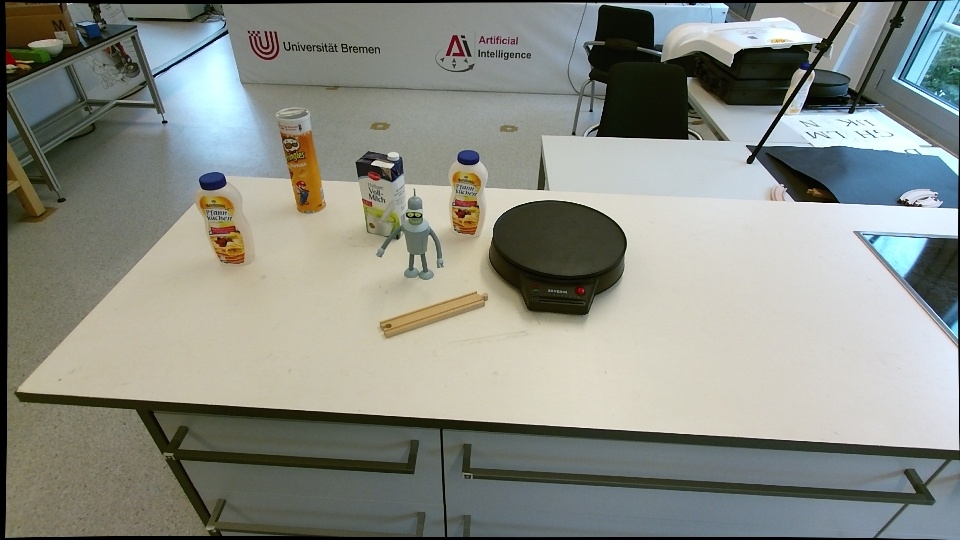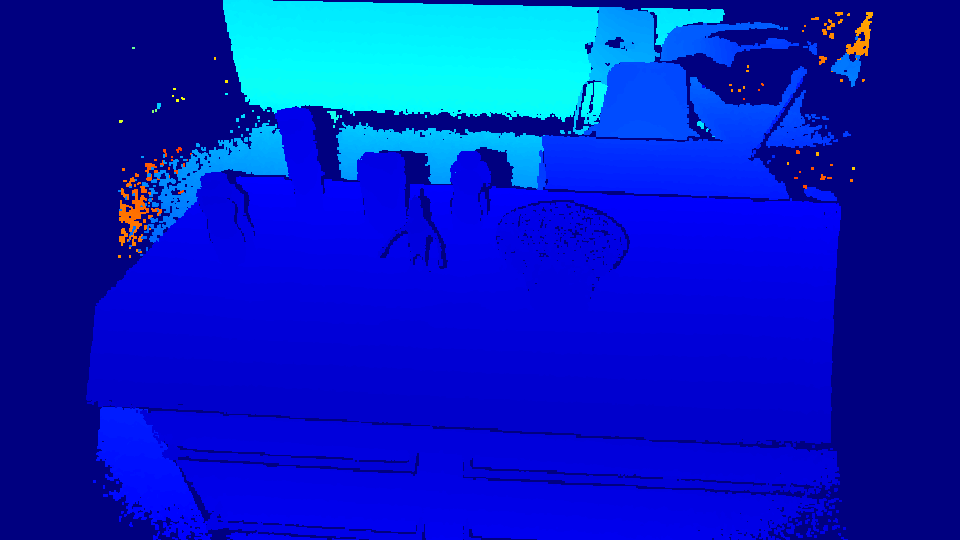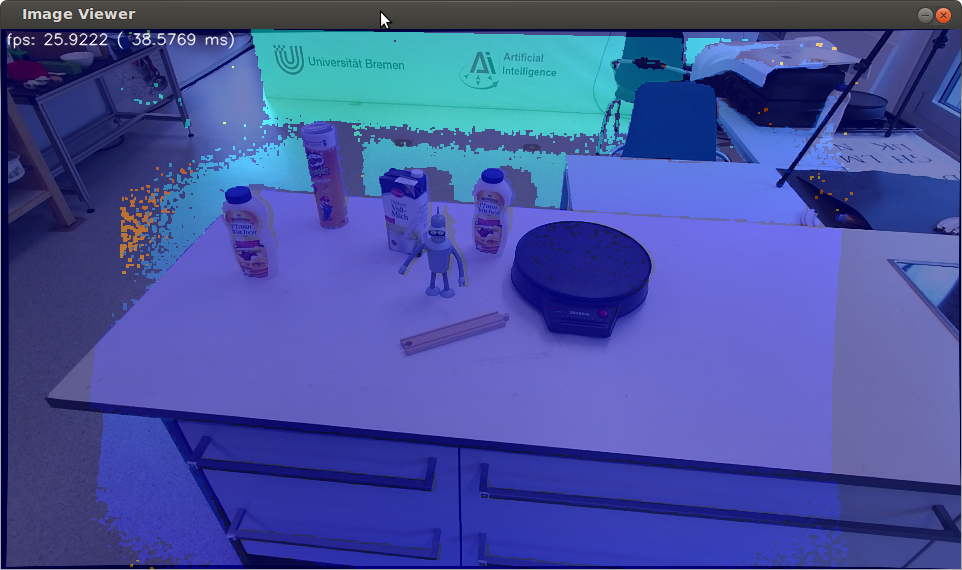- Thiemo Wiedemeyer <wiedemeyer@cs.uni-bremen.de>, Institute for Artificial Intelligence, University of Bremen
This is a collection of tools and libraries for a ROS Interface to the Kinect One (Kinect v2).
It contains:
- a calibration tool for calibrating the IR sensor of the Kinect One to the RGB sensor and the depth measurements
- a library for depth registration with OpenCL support
- the bridge between libfreenect2 and ROS
- a viewer for the images / point clouds
First you should look at this FAQ and the FAQ from libfreenect2. Secondly, look at issue page from libfreenect2 and the issue page of iai_kinect2 for similar issues and solutions.
Right now it will not work with OpenCV 3.0. The default version in Ubuntu and ROS and therefore also for the iai_kinect2 package is OpenCV 2.4.x.
There are many reasons why kinect2_bridge might not working. The first thing to find out whether the problem is related to kinect2_bridge or libfreenect2. A good tool for testing is Protonect, it is a binary located in libfreenect2/build/bin/Protonect. It uses libfreenect directly with a minimal dependency on other libraries, so it is a good tool for the first tests.
Execute:
./Protonect glto test OpenGL support../Protonect clto test OpenCL support../Protonect cputo test CPU support.
Before running kinect2_bridge please make sure Protonect is working and showing color, depth and ir images. If some of them are black, than there is a problem not related to kinect2_bridge and you should look at the issues from the libfreenect2 GitHub page for help.
If one of them works, try out the one that worked with kinect2_bridge: rosrun kinect2_bridge kinect2_bridge depth_method:=<opengl|opencl|cpu>. You can also change the registration method with reg_method:=<cpu|opencl>.
If that is the case, you have to make sure that Protonect uses the same version of libfreenect2 as kinect2_bridge does. To do so, run make and sudo make install in the build folder again. And try out kinect2_bridge again.
cd libfreenect2/build
make & sudo make install
This is the normal behavior. 'kinect2_bridge' will only process data when clients are connected (ROS nodes listening to at least one of the topics). This saves CPU and GPU resources. As soon as you start the kinect_viewer or rostopic hz on one of the topics, processing should start.
rosdep will output errors on not being able to locate [kinect2_bridge] and [kinect2_registration]. That is fine because they are all part of the iai_kinect2 package and rosdep does not know these packages.
This indicates problems with the USB connection.
First of all, check the issue pages on GitHub for similar issues, as they might contain solutions for them. By default you will only see the open issues, but if you click on closed you will the the ones solved. There is also a search field which helps to find similar issues.
If you found no solution in the issues, feel free to open a new issue for your problem. Please describe your problem in detail and provide error messages and log output.
- ROS Hydro/Indigo
- OpenCV (2.4.x, using the one from the official Ubuntu repositories is recommended)
- PCL (1.7.x, using the one from the official Ubuntu repositories is recommended)
- Eigen (optional, but recommeded)
- OpenCL (optional, but recommeded)
- libfreenect2
-
Install the ROS. Instructions for Ubuntu 14.04
-
Install libfreenect2:
Follow the instructions and enable C++11 by using
cmake .. -DENABLE_CXX11=ONinstead ofcmake .. -
Copy the udev rule file
sudo cp libfreenect2/rules/90-kinect2.rules /etc/udev/rules.d/and reconnect the sensor -
Clone this repository into your catkin workspace, install the dependencies and build it:
cd ~/catkin_ws/src/ git clone https://github.com/code-iai/iai_kinect2.git cd iai_kinect2 rosdep install -r --from-paths . cd ~/catkin_ws catkin_make -DCMAKE_BUILD_TYPE="Release"
*Note: `rosdep` will output errors on not being able to locate `[kinect2_bridge]` and `[depth_registration]`. That is fine because they are all part of the iai_kinect2 package and `rosdep` does not know these packages.*
6. Connect your sensor and run `kinect2_bridge`:
rosrun kinect2_bridge kinect2_bridge
7. Calibrate your sensor using the `kinect2_calibration`. [Further details](kinect2_calibration#calibrating-the-kinect-one)
8. Add the calibration files to the `kinect2_bridge/data/<serialnumber>` folder. [Further details](kinect2_bridge#first-steps)
9. Restart `kinect2_bridge` and view the results using `rosrun kinect2_viewer kinect2_viewer kinect2 sd cloud`.
## OpenCL
### OpenCL with AMD
Install the latest version of the AMD Catalyst drivers from https://support.amd.com and `opencl-headers`.
### OpenCL with Nvidia
Install the latest version of the Nvidia drivers, for example `nvidia-355` and `nvidia-modprobe` from [ppa:graphics-drivers/ppa](https://launchpad.net/~graphics-drivers/+archive/ubuntu/ppa) and `opencl-headers`.
### OpenCL with Intel
You can either install a binary package from a PPA like [ppa:pmjdebruijn/beignet-testing](https://launchpad.net/~pmjdebruijn/+archive/ubuntu/beignet-testing), or build beignet yourself. It's recommended to use the binary from the PPA.
#### Building Beignet
Download and compile the newest Beignet release from source.
##### Known configuration
- Ubuntu 14.04
- Kernel 3.13 (>= 3.13.0-35-generic) or Kernel 3.16 (needed for the Intel USB 3.0 Controller)
- Beignet v1.0 (http://www.freedesktop.org/wiki/Software/Beignet/)
##### Dependencies for Beignet
For Beignet the following depencies have to be installed manually:
* ocl-icd-dev
* ocl-icd-libopencl1
* libdrm / libdrm-dev
* llvm-3.5 / llvm-3.5-dev
* clang-3.5 / clang-3.5-dev
* libegl1-mesa-dev
* libedit-dev
##### Additional steps (if needed):
* Error "clang: not found":
sudo ln -s /usr/lib/llvm-3.5/bin/clang /usr/bin/clang
* Known Beignet issue with Kernel 3.15/3.16 (see Beignet readme); fix is to disable cmd_parser:
sudo su echo 0 > /sys/module/i915/parameters/enable_cmd_parser
* To get 100% pass rate on the Beignet unit tests you may have to:
* Execute directly on hw: ssh-session might not work
* Execute as root
*Note: Both previous points have to to with the fact that no x-server was installed. Apparently this will be fixed in a future release of Beignet.*
#### Results on Intel i7-3840QM (mobile hardware)
* **~100 fps** on the OpenCLDepthPacketProcessor (compared to < *5 fps* on same hardware using CPU-based depth registration!)
... [OpenCLDepthPacketProcessor] avg. time: 10.1716ms -> ~98.3129Hz [TurboJpegRgbPacketProcessor] avg. time: 16.0787ms -> ~62.194Hz ...
## Citation
If you used `iai_kinect2` for your work, please cite it.
```tex
@misc{iai_kinect2,
author = {Wiedemeyer, Thiemo},
title = {{IAI Kinect2}},
organization = {Institute for Artificial Intelligence},
address = {University Bremen},
year = {2014 -- 2015},
howpublished = {\url{https://github.com/code-iai/iai\_kinect2}},
note = {Accessed June 12, 2015}
}
The result should look something similar to this (may depend on the bibliography style used):
T. Wiedemeyer, “IAI Kinect2,” https://github.com/code-iai/iai_kinect2,
Institute for Artificial Intelligence, University Bremen, 2014 – 2015,
accessed June 12, 2015.



